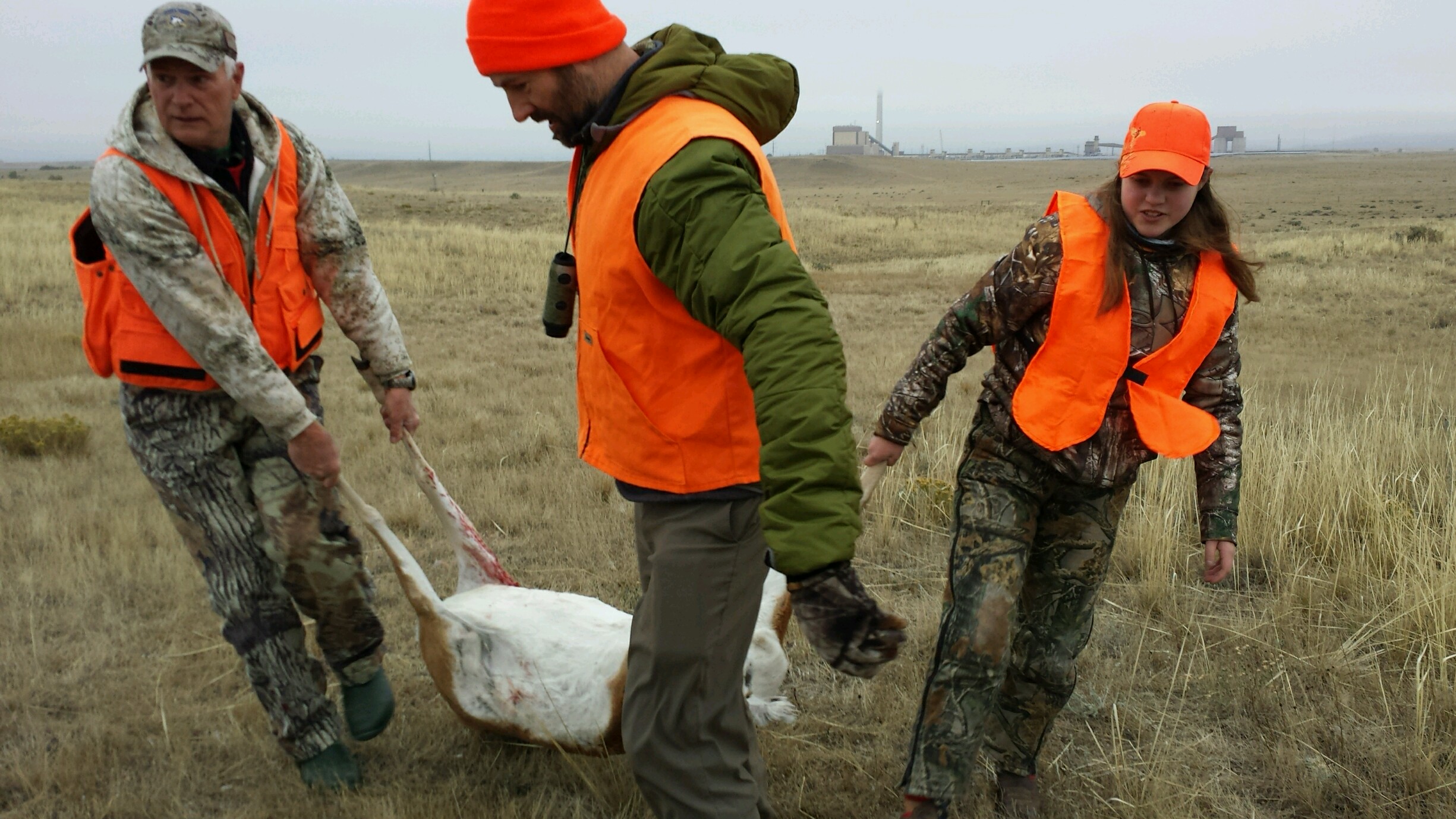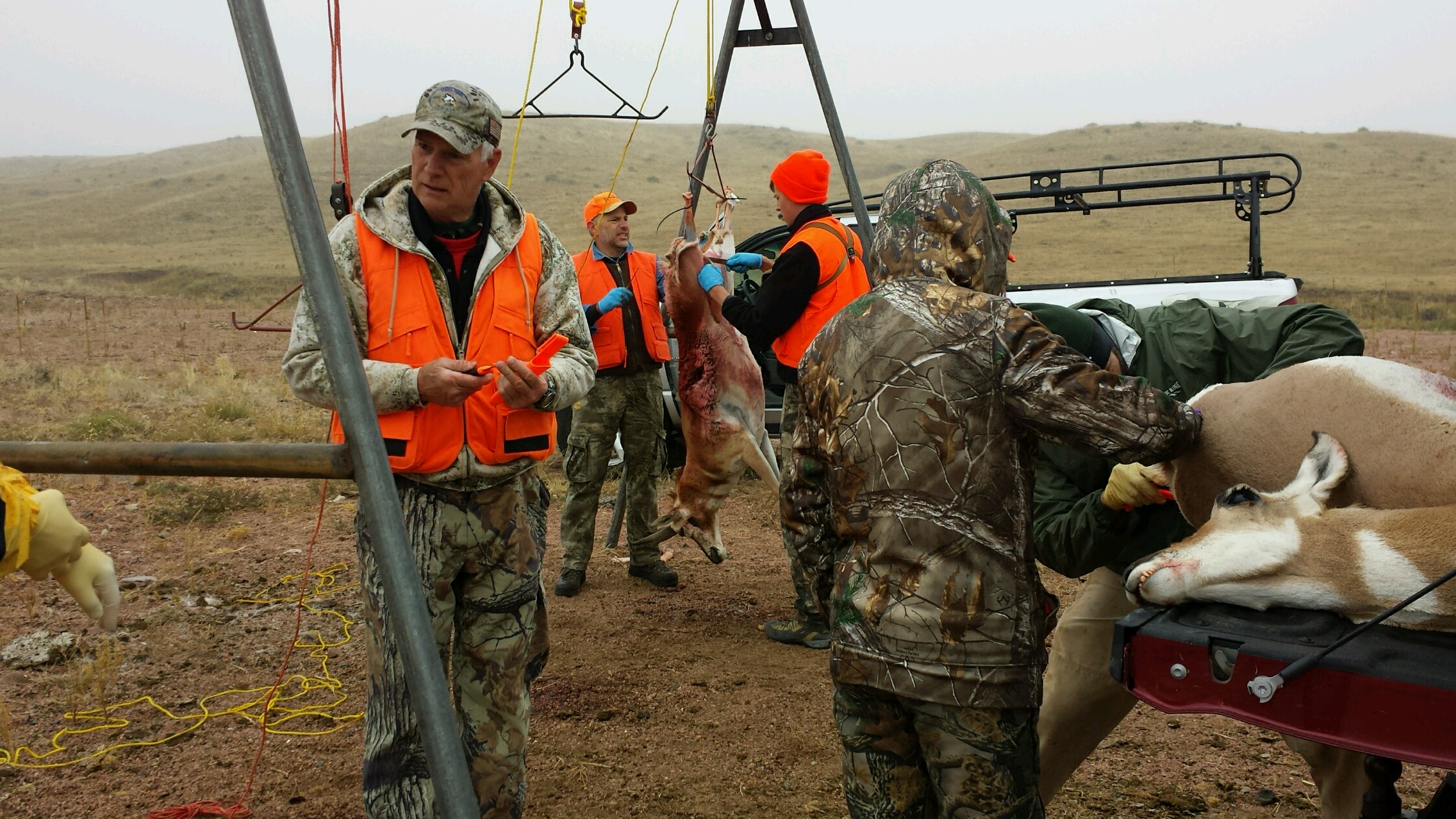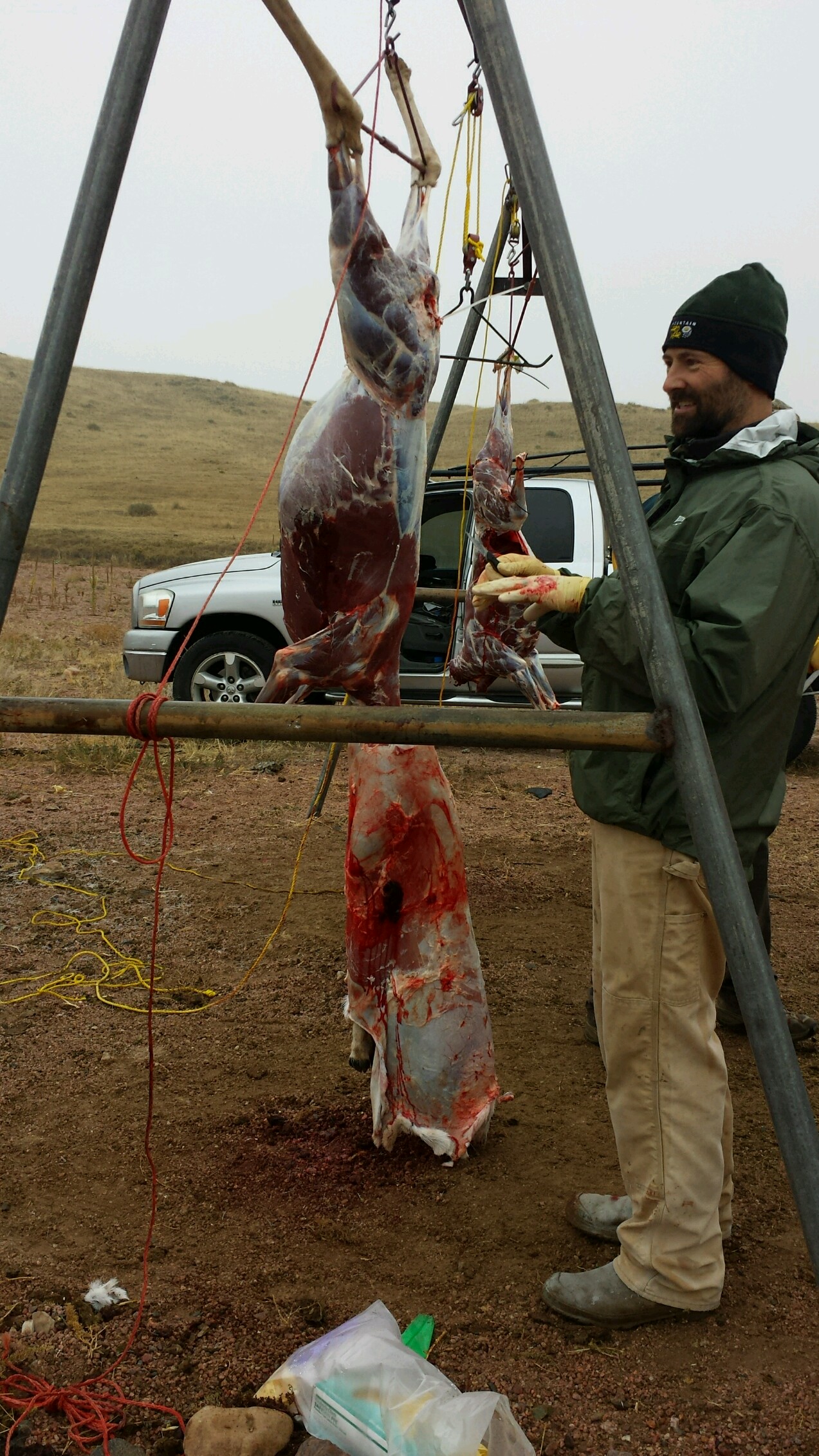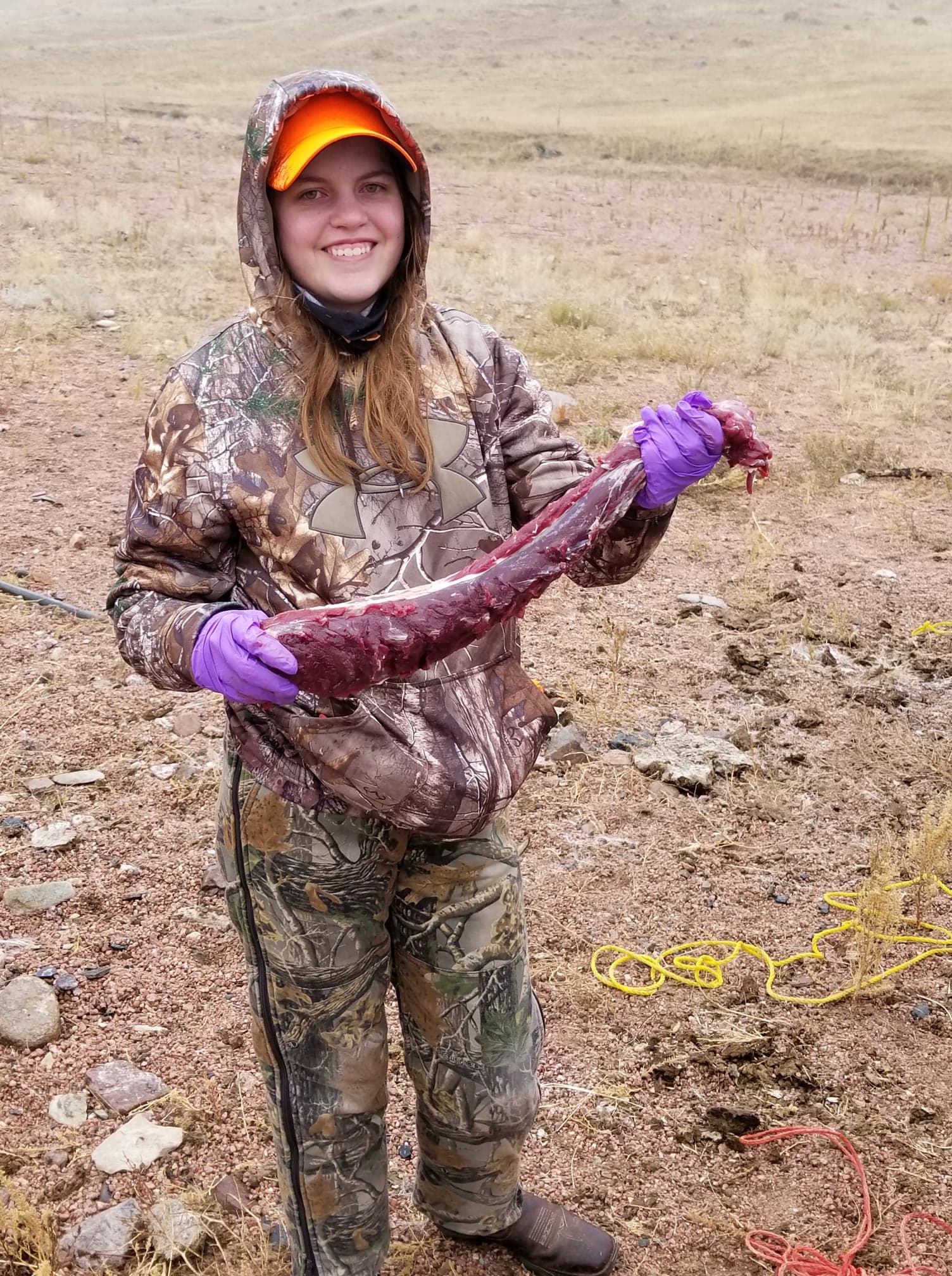Our work was far from over though. We had to fill out my tag, and then bring the pronghorn back to camp to be butchered. Once the doe was butchered at camp, I had to bring her home, and proceed to clean and cut the meat into smaller pieces, to be wrapped in freezer paper and packed in the freezer to be eaten. Not only that, but I planned on preserving the hide and the skull, which would take even more work. Hunting the pronghorn was not even half of the job.
Tom picked up the doe's front legs, while Mike and I each took the doe by one of her back legs. We carried her to the truck, and then I let the guys lift her into the truck while I stood back.

I unloaded my firearm, and then joined my grandparents in the truck. Again, I excitedly recounted the final seconds leading up to the doe's death, and told them just how excited I was to cook some of the pronghorn on the grill that night. My grandparents couldn't express just how proud of me they were, and shared my excitement about grilling up some pronghorn. I offered some pronghorn to my grandparents, but they both declined, saying that I earned all of it, and I needed to eat it all myself.
It was a short drive back to camp. We were no longer stalking the pronghorn, and the fog had lifted, so we could drive quicker. Plus, we had to get to camp as quickly as possible to cool down the meat in the cold air. The meat would stay good for just long enough for us to cool it, but it couldn't stay warm forever.
Back at camp, Tom immediately made me go into the check-in tent to warm up next to the propane heater. I was shivering violently, and my hands were so cold that they were too stiff and numb to move. Tom was worried that I was in the beginning stages of hypothermia, and wanted to make sure I got warmed up as quickly as possible. I stopped shivering with a few minutes once I was out of the cold, and everyone else used that time to get ready to butcher the pronghorn.
As soon as I was warm again, I walked in the cold to the skinning rack, which was about fifty yards away from camp, just as Tom backed his truck towards the rack with my pronghorn in the trunk. Mike opened the tailgate and pulled the pronghorn onto it. Mike instructed me to hold up her tail while he went to work at her rear. Before we could get to the meat, we had to remove the waste and close off the pronghorn's rectum so no meat would be spoiled. If any waste touched the meat, that meat would be immediately contaminated and unsafe to eat, even if the waste was rinsed off. There are a lot of diseases found in the waste of animals that are highly contagious and immediately spread to everything it touches. The five-second-rule is a myth!
Meanwhile, Tom sharpened his best knife for Mike to use later, and a couple of guys worked on a small buck on the rack next to ours. Whoever shot the buck used a round that was way too big, destroying the edible guts and leaving a giant gaping hole in the buck's ribs. Luckily, the main cuts of meat were not damaged on that buck.

Once all of the waste had been removed from the doe and her rectum had been properly tied, Mike and another volunteer dragged her off the tailgate by her rear legs, and then hung her upside down on the rack by a metal hanger. They hoisted her up and tied the rope to the A-frame, so she hovered above the ground.

Mike skinned her, starting at her thighs and then worked downwards. I watched Mike like a hawk. He worked very slowly and carefully, only slicing the hide with one motion of the knife each time, like he was trying to paint a canvas by only stroking the brush in one direction. He worked slowly so he didn't put holes through the hide or get more blood on the fur than there already was. It took him fifteen minutes to skin her before he could just pull the rest of the hide off her torso like a sock. Once the bulk of the meat was exposed, Mike stopped working on the hide and went straight to work on the meat with a couple more volunteers. As beautiful as the hide is, the meat is by far the most important part of any game animal, and must be put on ice as quickly as possible.
When you see pictures of hunters with antlers sticking out of their backpacks, those hunters have meat in their backpacks, as well as several other bags that they have with them. Some people see those pictures and think, "Well, that guy's only got the head in there and nothing else", when in reality, the meat is stuffed into the bag first because it is the most important part of the animal. The head and hide don't get to be put in the backpacks first, because they are not nearly as important. If the head and the hide are put in first, not only does that hunter not have his priorities straight, he'd breaking the law and putting the edible meat at extreme risk. Most, if not all states make hunters harvest the meat from what they kill, unless that meat was somehow contaminated or belonged to a diseased animal, or that hunter was going for vermin. Even then, most vermin animals (except for rodents) can be safely turned into food.

Back at the dressing rack, Mike and a few other volunteers first cut off the backstraps, which are arguably the best part of the pronghorn, or any game animal for that matter. The backstraps are the muscles running from the base of the neck to the base of the tail on the pronghorn, and they're usually cut up into steaks. Because of how valuable the backstraps were, Tom had me pose for a picture while holding one of the backstraps, before I shoved it into ice.

After the backstraps were harvested, the shoulders were harvested. Mike put them on ice as they were. I agreed to de-bone and cut them into smaller pieces at home. They cut out the rounds, which was the meat just ahead of the hips, which could be made into more steaks or roasts depending on what I was hungry for. The sirloins were cut out and quickly put on ice, as was the rest of the neck meat. Finally, the flanks were harvested, and attached to one of the flanks was the doe's udder. I had to take the doe's udder with me, along with the tag, on the way home, so if we found ourselves at a hunter's checkpoint on the highway, the authorities could quickly and easily determine that I went on a legal hunt. If I harvested a buck, the same rules would apply. The genitals of a game animal must be attached to the meat itself for it to be considered a legal kill. The genitals can only be discarded once the animal has been fully butchered and put into the freezer.
Eventually, all that was left was the torso. There was hardly any meat on the ribs, so we didn't bother to take them. However, I did want to eat the liver and the heart, and Mike reluctantly volunteered to get them for me. Heart has always been one of my favorite cuts of meat, aside from the backstraps.
I stood upwind from the torso with the rest of the volunteers, as poor Mike got down to his knees and stuck his entire arm into the warm torso. The torso was starting to smell, which made Mike gag while the rest of us giggled at his suffering. In reality, we weren't actually laughing at Mike. We were laughing with him. Mike narrated his experience as he desperately felt around for the liver and the heart, which made us all, including Mike, laugh and gag even harder. As Mike moved his arm around in the torso, he forced a lot of gases out, causing the torso to sputter and spew out blood from various holes and cuts. Mike eventually found the heart and threw it at me, which I almost didn't catch because it was a low throw. He then found the liver, which was a lot more fragile, and carried it over to the plastic box full of ice. We put the heart and liver in a bag, and buried it in the ice along with the rest of the meat. I threw in the bright green tag with the meat, and my grandparents closed the box, while Mike heaved the inedible pronghorn carcass into a massive gut pile.
Mike came back from the gut pile and helped me stuff a second box of ice with the hide and head, so I could preserve the skull and hide. When we were finished, about twenty minutes had passed, and we could finally relax and socialize. My grandpa took out two boxes of Mountain Dew from the backseat, and everyone who helped with the hunt grabbed themselves a room-temperature can of the caffeinated soda. It wasn't bad tasting at all. In fact, in the thirty degree weather, it was actually very pleasant.
After a half hour, my grandma stepped out of the SUV, book in hand, and pressured me and my grandpa to end our conversations and start heading home. The ice wouldn't last forever, and we still had a lot of driving and work to do. Hunting the pronghorn was hardly half of the work! After saying our final "Thank you" and "Goodbye", we headed off into the fog, away from the ranchlands on those beautiful golden plains, towards home.

